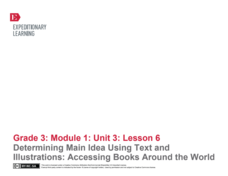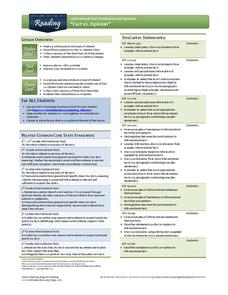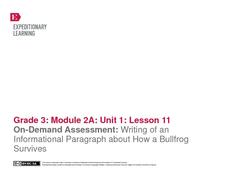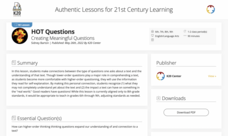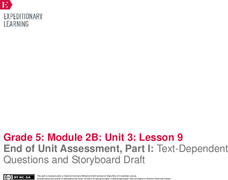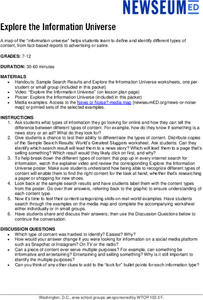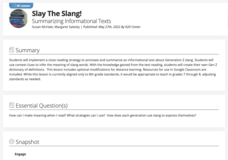EngageNY
Determining Main Idea Using Text and Illustrations: Accessing Books Around the World
Ease into informational text with the lesson suggested here. Part of a unit series, the lesson draws from previous lessons and acts as a natural moment to add in informational text. Class members read one section of My Librarian is a...
For the Teachers
Fact vs. Opinion
Many informational texts are written as factual, but can your learners determine when an opinion is presented as fact? Have your kids read several articles on the same topic and record the statements that contain either facts or...
Curated OER
Comprehension: Create a Summary from an Expository Text
Children can learn to analyze expository or informational texts at nearly any age. This scaffolded and scripted resource provides teachers with the support needed to facilitate a thoughtful lesson on summarizing informational text by...
EngageNY
Synthesizing from Informational Texts: Main Idea and Key Details from Promises to Keep (Pages 8– 10)
Learners determine the main idea of a timeline on pages eight and nine of the text Promises to Keep. They use the timeline to complete a Main Idea and Details note catcher and then share their thoughts with the class. To finish,...
ReadWriteThink
"Three Stones Back": Using Informational Text to Enhance Understanding of Ball Don't Lie
"Three Stones Back," a passage from Matt de la Pena's best-seller, Ball Don't Lie, allows readers to practice their close reading skills as they compare the passage to an information text about wealth inequality.
Curated OER
New Information
Young readers explore informational texts as they read a text entitled Giant Pandas by Gail Gibbons. The teacher will begin by explaining that one characteristic of informational texts is that they teach the reader new information and...
Curated OER
Advertising in the Contemporary World: An Introduction to Persuasive Texts
Beginning a persuasive writing unit with your middle schoolers? Approach it through something that persuades us all: advertising! Through studying video and print advertisement, your class will practice Common Core skills for reading...
EngageNY
Grade 9 ELA Module 2, Unit 3, Lesson 5
After rereading the full text of Walter Mosley's essay "True Crime," groups complete an evidence collection tool worksheet, and then class members independently draft a multi-paragraph, evidence-based response that identifies how Mosley...
Hood River County School District
Text Structure: Features and Organization
Teach learners how to interact with both fiction and non-fiction text with a packet of activities and worksheets. After looking over text structure and the difference in text features between different types of writing, readers analyze...
EngageNY
Grade 9 ELA Module 3, Unit 1, Lesson 6
Are cattle prods beneficial for herding cattle, or do they cause more harm than good? Investigate Temple Grandin's claim about animal behavior with a lesson that focuses on pages 20-23 of the first chapter of her book, Animals in...
EngageNY
Reading for Gist and Answering Text-Dependent Questions: Local Sustainable Food Chain
Readers use sticky notes and a Reading Closely: Guiding Questions handout to record the gist of a different section (pages 161-166) in The Omnivore’s Dilemma. They then pair up and share their ideas. To end the lesson, readers complete...
EngageNY
Finding Relevant Information and Asking Research Questions: The Benefits of Video Games
Video games may not be so bad after all. As scholars read the text "The Many Benefits, for Kids, of Playing Video Games," they summarize the gist in their researchers' notebooks. Next, pupils draft supporting research questions based on...
EngageNY
Organizing an Opinion, Reasons, and Evidence: Text 2 for Each Expert Group
The proof is in the reading. Using the informative resource, scholars read a second article about either Althea Gibson or Roberto Clemente. As they read, they continue adding reasons and evidence to their graphic organizers to show how...
Curated OER
Lesson Plan for Japan
The effect of cultural beliefs on the progress and industrialization of a society is an interesting idea to consider, and this is certainly true in this lesson on feudal Japan. Your young historians will read informational texts on...
EngageNY
On-Demand Assessment: Writing of an Information Paragraph About How a Bullfrog Survives
Having read and discussed Bullfrog at Magnolia Circle, third graders demonstrate their bullfrog expertise by writing informational paragraphs. Building on the note-taking and paragraph planning from the previous lesson plan, learners...
Roseburg Public Schools
Library Skills and Literature
The library is such a valuable resource for kids of all ages. Help elementary readers learn all about parts of the library, text features for both fiction and nonfiction text, and different ways to find books that they want to read.
Lerner Publishing
Meet the Dinosaurs
Take your class of youngsters on a prehistoric adventure with this four-lesson series on dinosaurs. Accompanying the Meet the Dinosaurs books by Don Lessem, these lessons engage children in writing their own dinosaur books, making...
K20 LEARN
HOT Questions: Creating Meaningful Questions
Scholars examine a list of questions and sort them into corresponding groups based on similarities. A gallery walk allows peers to see how their peers sorted questions and leave notes. Costa's Level of Questions is the topic of a...
EngageNY
End of Unit Assessment, Part 1: Text-Dependent Questions and Storyboard Draft: “You Can Do a Graphic Novel” Excerpt
Eyes on the finish line. Serving as the first part of the end of unit assessment, learners answer questions based on a text about how to write a graphic novel. Using what they've learned, they then create a storyboard about the invention...
K20 LEARN
The K20 Chronicle, Lesson 3: Crafting the Article
Picture your class members as photojournalists! Using their interview with a senior as a starting point, would-be photojournalists begin developing an outline for their article by examining their notes from the interview, gathering...
Newseum
Explore the Information Universe
Distinguishing among different types of content when conducting online searches can be a challenge. An informative resource helps researchers identify different types of content, from fact-based reports to ads, from propaganda to satire....
K20 LEARN
Slay the Slang! Summarizing Informational Texts
Middle schoolers get hip to the jive with a lesson about slang. They closely examine examples of slang and use context clues to infer the meaning of the terms. Groups read and summarize an article about a teacher who created a Gen Z...
Core Knowledge Foundation
Native Americans—Regions and Cultures Tell It Again!™ Read-Aloud Anthology
Native Americans are the focus of a read-aloud anthology. Over two weeks, third graders listen to and discuss informational texts detailing the life and culture of various regions. Pupils complete extension activities and show what they...
Core Knowledge Foundation
Plants Tell It Again!™ Read-Aloud Anthology
A 190-page anthology explores the life and parts of plants, flowers, and trees while boosting reading comprehension skills. Literature and informational texts showcase Johnny Appleseed and George Washington Carver. Lessons follow the...


